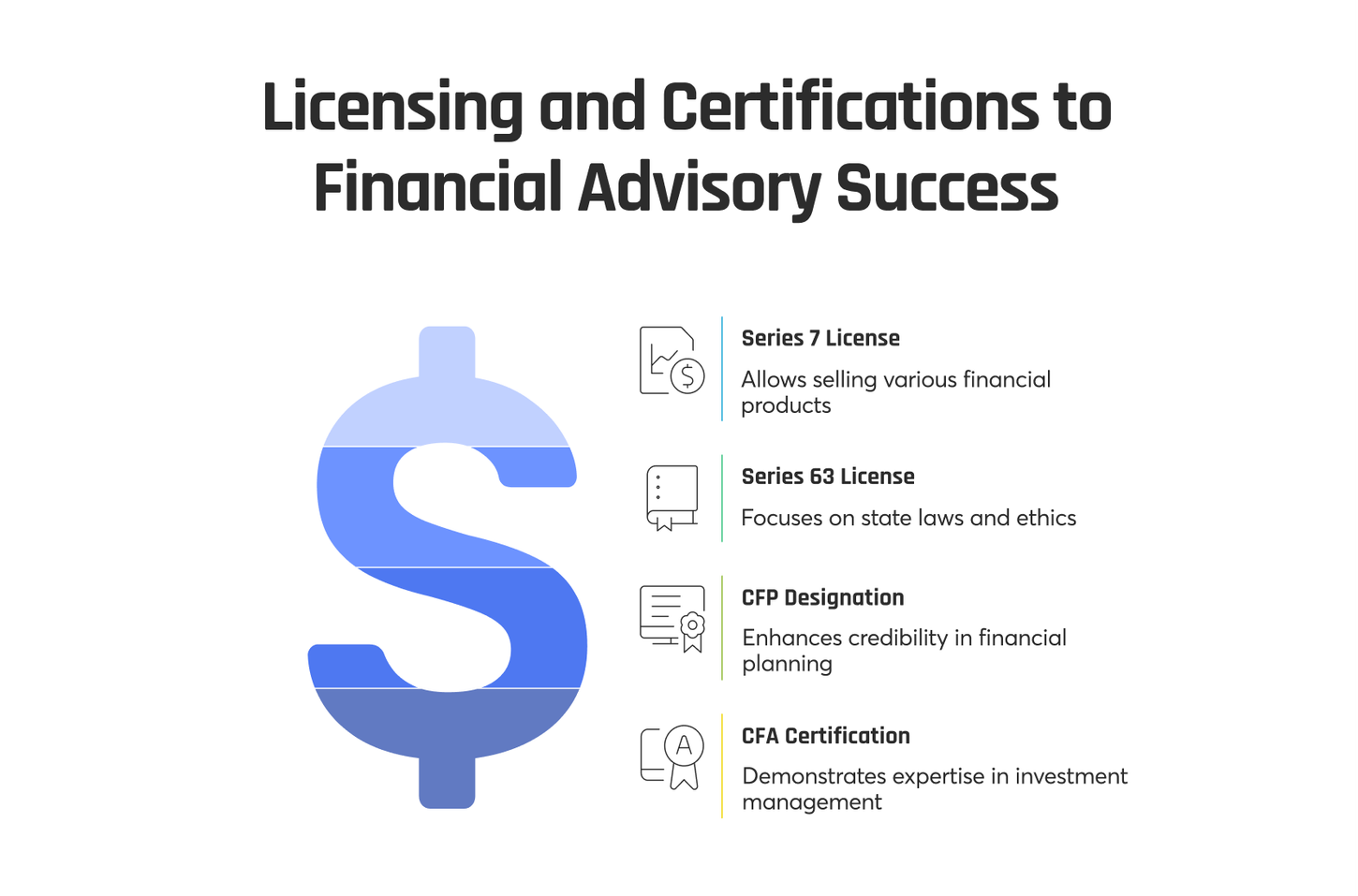Choosing the right path to become a successful financial advisor can be tricky.
A bachelor's degree in finance or business is often needed. This blog post will guide you through essential qualifications, from education to skills, for success in advising on financial goals and investments.
Educational Requirements
To succeed as a financial advisor, obtaining a bachelor's degree in finance, economics, or business is essential. Advanced degrees can also contribute to career growth and opportunities for professional development.
Bachelor's degree in finance, economics, or business
A bachelor's degree in finance, economics, or business is a key step for anyone looking to become a financial advisor. This education gives you the basic knowledge needed to understand financial markets, investment opportunities, and how to create effective financial strategies for clients.
You learn about different types of investments like mutual funds and securities. It also covers important areas like tax laws and risk management.
Having this degree shows potential clients that you know your stuff. It prepares you for further certifications and licenses required in the financial industry. Most firms hiring financial advisors expect at least this level of education.
So, if you're thinking about a career in providing personal financial advice or managing investment portfolios, start with getting a business degree in one of these fields.
Advanced degrees for career growth
Getting a master's degree can help financial advisors move up in their careers. Some go for an MBA or a Master's in Finance to learn about business, management, and advanced financial planning.
These degrees make advisors more skilled. They can then handle bigger clients and complex investment situations.
Mastering finance goes beyond basic degrees; it demands continual learning and specialization.
Courses from the American College of Financial Services also offer special studies. Here, advisors can get Chartered Financial Consultant (ChFC) designations. This shows they know a lot about insurance, estate planning, and retirement saving.
With these qualifications, advisors stand out and can do better work for their clients.
Licensing and Certifications
To become a successful financial advisor, obtaining licensing and certifications is essential. Meeting the requirements for Series 7 and Series 63 licenses, as well as achieving designations such as Certified Financial Planner (CFP) and Chartered Financial Analyst (CFA), paves the way for professional growth in this field.

Series 7 and Series 63 licenses
The Series 7 license is key for financial advisors. It allows them to sell almost all types of financial products. To get it, one must pass a tough exam. This test covers many topics about trading, customer accounts, and regulations.
Financial professionals also need the Series 63 license to work in most states. This license focuses on state laws and ethics requirements. Getting this means passing another exam that tests knowledge of these specific areas.
Certified Financial Planner (CFP) designation
Transitioning from acquiring Series 7 and Series 63 licenses, achieving the Certified Financial Planner (CFP) designation is a crucial milestone for financial advisors. The CFP certification requires candidates to meet educational criteria, pass a comprehensive exam, acquire relevant work experience in the financial planning field, and adhere to ethical standards set by the CFP Board.
With over 88,000 CFP professionals in the United States alone, holding this designation not only enhances credibility but also demonstrates commitment to expertise in areas such as retirement planning, estate planning, tax management strategies, and investment management.
As of June 2021, there were more than 3 million people working globally in finance-related occupations with a projected job growth rate of about five percent until 2029 emphasizing an increasing demand for qualified financial planners who hold certifications like CFP.
The Certified Financial Planner (CFP) designation upholds a high standard for competence and ethics within the financial planning industry.
Chartered Financial Analyst (CFA) certification
Transitioning from the Certified Financial Planner (CFP) designation, the Chartered Financial Analyst (CFA) certification is a highly esteemed credential for financial advisors. This globally recognized qualification delves deep into investment management and analysis, making it essential for those advising on financial investments and effectively managing clients’ portfolios.
Many successful financial advisors hold this certification to demonstrate their expertise in investment planning and understanding complex investment products.
The CFA program covers a broad range of topics such as accounting, economics, ethics, and professional standards, providing candidates with a comprehensive skill set to address various aspects of financial advisory work.
Over 150,000 professionals worldwide have attained this prestigious designation; therefore, it's important for those seeking more than just standard accreditation. Additionally, possessing a CFA charter can open doors to career advancement and networking opportunities within large firms or when pursuing private practice within the ever-evolving realm of financial needs.
Key Technical Skills
Key Technical Skills are crucial for a financial advisor's success, covering areas such as financial planning and investment knowledge, risk assessment and management, as well as tax planning expertise.
These skills are essential in providing comprehensive and effective financial advice to clients.
Financial planning and investment knowledge
Financial planning and investment knowledge are essential for financial advisors. They must grasp securities industry essentials and offer tax guidance. Holding specific licenses is crucial.
Advisors should excel in conducting business and possess sales experience, which aids in client acquisition strategies. Keeping abreast of regulations and market trends is vital for managing potential risks and positively impacting their clients' financial future.
In the financial planning world, possessing expertise in tax planning, risk assessment, and management forms the foundation of a successful career, allowing advisors to tailor their advice to constantly changing market conditions.
Moreover, being proficient with the latest computer programs crafted to improve financial analysis skills offers an advantage when seeking more than just professional experience.
Risk assessment and management
Financial advisors must comprehend risk assessment and management to evaluate potential risks linked with investment opportunities. This involves keeping abreast of market trends and regulations to make informed recommendations for client portfolios, thereby enabling well-informed investment decisions.
For instance, understanding various investment types like variable annuities can help advisors accurately assess associated risks. Moreover, conducting detailed risk assessment not only positively impacts client portfolios but also fosters credibility within the industry, attracting new clients.
Tax planning expertise
Financial advisors must possess tax planning expertise to assist clients in minimizing tax obligations and optimizing financial plans. Comprehensive knowledge of the tax code, encompassing deductions and credits, is essential for delivering holistic financial guidance.
Advisors should integrate investment strategies with tax-efficient methods for retirement planning, estate management, and wealth transfer. By including tax planning in their services, financial advisors can provide personalized solutions that align with clients' long-term financial objectives and maximize savings opportunities.
Additionally, it is crucial for advisors to stay informed about continuously evolving regulations and emerging trends in the realm of taxation. This enables advisors to unveil the intricacies of complex tax laws while ensuring compliance and generating positive impact for client portfolios by improving overall returns via strategic tax planning.
Essential Soft Skills
Essential soft skills for financial advisors include effective communication, empathy, and strong problem-solving abilities. Learn more about acquiring these crucial skills to excel in the financial advisory industry.
Strong communication and interpersonal skills
Financial advisors require strong communication and interpersonal skills to effectively engage with clients. Vital during client meetings, active listening and empathetic communication ensure a thorough understanding of client needs and concerns.
Moreover, clear and effective communication is essential for articulating complex financial concepts to clients, fostering trust and comprehension between advisors and their clients.
Furthermore, establishing connections through networking is pivotal in the financial advisory realm. These skills are essential not just for acquiring new clients but also for nurturing enduring relationships with existing ones, forming a solid client base.
These interactions often encompass addressing inquiries about licensing requirements or offering tax advice, necessitating robust verbal and written communication skills.
Empathy and active listening
Financial advisors must possess strong interpersonal skills, including empathy and active listening. These skills are crucial for understanding clients' needs and concerns, building rapport, and fostering meaningful relationships.
For example, when providing tax advice or conducting business administration, the ability to effectively listen to clients' financial goals and show understanding of their challenges can lead to customized solutions that align with their specific circumstances.
In the financial industry, these soft skills play a pivotal role in establishing connections with clients as they seek more than just financial guidance; they also desire an advisor they can trust who genuinely understands their individual situations.
Active listening is equally important since it enables financial advisors to understand clients' complex financial preferences and provide appropriate recommendations aligned with those expectations.
By integrating empathy and active listening into client interactions in the ever-evolving world of finance, certified financial planner (CFP) professionals can better navigate intricacies and ultimately deliver personalized financial advice that meets each client's unique needs.
Analytical thinking and problem-solving
Moving from the need for empathy and active listening, financial advisors must also excel in analytical thinking and problem-solving to provide top-notch service. Analytical skills are crucial as they help advisors assess complex financial data, identify patterns, and make strategic decisions.
Problem-solving is equally vital since it allows advisors to tackle diverse challenges faced by clients, such as investment choices or tax planning. With the constantly changing financial landscape, honing these skills ensures that financial advisors can handle challenges with ease while creating tailored solutions for their clients’ needs.
When conducting business within the financial industry regulatory authority framework, solid analytical thinking and problem-solving support a successful career path for any aspiring or established financial advisor.
Business Development Skills
Build your network and establish strong relationships with clients. Master sales techniques to acquire new clients and grow your business.
Networking and relationship building
Financial advisors must develop strong networking and relationship building skills to expand their client base. Cultivating connections with potential clients, other professionals, and industry leaders is essential for success in the financial advisory field.
Participating in professional networks, attending industry events, and utilizing social media can all facilitate building a strong client network.
In addition, sustaining positive relationships with existing clients through regular communication and personalized service is vital for client retention. By actively nurturing these relationships, financial advisors can bolster their reputation and gain new clients through word-of-mouth referrals.
Overall, effective networking and relationship building are critical components of a successful career as a financial advisor.
Sales and client acquisition strategies
To attract clients, financial advisors must excel in sales and client acquisition strategies. Building a strong network through events, referrals, and professional organizations is crucial.
Advisors should leverage their technical expertise to demonstrate value to potential clients by offering personalized financial plans and tax advice. Many advisors find success in cultivating long-term relationships by providing exceptional service and seeking learning opportunities that allow them to stay updated on market trends and regulations.
The ability to answer questions with empathy, understanding the client's needs deeply, is essential for effective client acquisition. Moreover, ensuring that the communication style aligns with analytical thinking helps build trust while showcasing authoritative knowledge in finance.
Through these methods, many financial advisors successfully grow their clientele while maintaining a high standard of service delivery.
Lifelong Learning and Adaptability
Staying updated on regulations and market trends is crucial for financial advisors. Embracing technological advancements ensures they stay relevant in a rapidly changing industry.
Staying updated on regulations and market trends
Financial advisors must stay updated on regulations and market trends to provide the best advice. Regulations often change, impacting how financial advisors work and provide tax advice.
For example, in 2020, the SEC amended the "accredited investor" definition, allowing more investors to participate in private markets. Market trends also affect advising strategies; when interest rates change, it can influence investment recommendations.
Advisors who hold a Certified Financial Planner (CFP) designation are required to complete continuing education courses related to ethics and regulations every two years. Keeping up-to-date with these requirements ensures that financial advisors are well-informed about any changes affecting their profession.
It's crucial for financial advisors to actively seek out information about new regulations and market trends through reputable sources such as industry publications or professional development seminars.
Embracing technological advancements
Financial advisors must embrace technological advancements in today's digital age. The integration of technology into their practices allows them to streamline operations, improve client experience, and stay competitive in the industry.
Employing advanced financial planning software enables advisors to provide more accurate and efficient advice tailored to their clients' needs. Furthermore, adopting digital marketing strategies can help them reach a wider audience and attract potential clients who increasingly seek financial services online.
Embracing digital tools not only enhances the overall efficiency of financial advisory services but also demonstrates an advisor's commitment to staying current with evolving consumer preferences and market trends.
Conclusion
Becoming a successful financial advisor requires the right blend of education, licenses, and skills. Many financial advisors begin with a bachelor's degree in finance or related fields.
Advanced degrees can pave the way for career growth and specialization.
Licensing exams such as Series 7 and Series 63 are necessary to conduct business and sell insurance products. Moreover, certifications such as Certified Financial Planner (CFP) or Chartered Financial Analyst (CFA) demonstrate expertise and reliability.
It's essential for financial advisors to have strong technical skills, including a solid understanding of financial planning, investment knowledge, risk assessment, management, and tax planning proficiency.
FAQs
1. What are the essential qualifications for becoming a financial advisor?
To become a successful financial advisor, one must pass multiple licensing exams and ideally hold certified financial planner (CFP) status. This profession also requires certain skills such as strong communication, analytical thinking, and problem-solving.
2. Do most financial advisors need to sell insurance?
Yes, in order to conduct business effectively, many financial advisors choose to sell insurance products as part of their services. Therefore, they often require additional qualifications or licenses related specifically to insurance.
3. How does one get the Certified Financial Planner (CFP) qualification?
The CFP is a recognized professional standard for most financial advisors. To obtain it, one must meet specific education requirements and pass a comprehensive multiple-choice test that covers various aspects of finance.
4. Are there other important skills needed beyond formal qualifications for success in this role?
Absolutely! Beyond formal educational requirements and passing the licensing exam, soft skills like effective communication with clients and ethical decision-making are crucial for success as a Financial Advisor.



